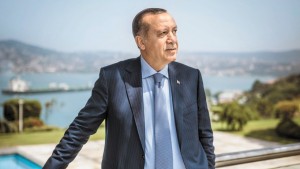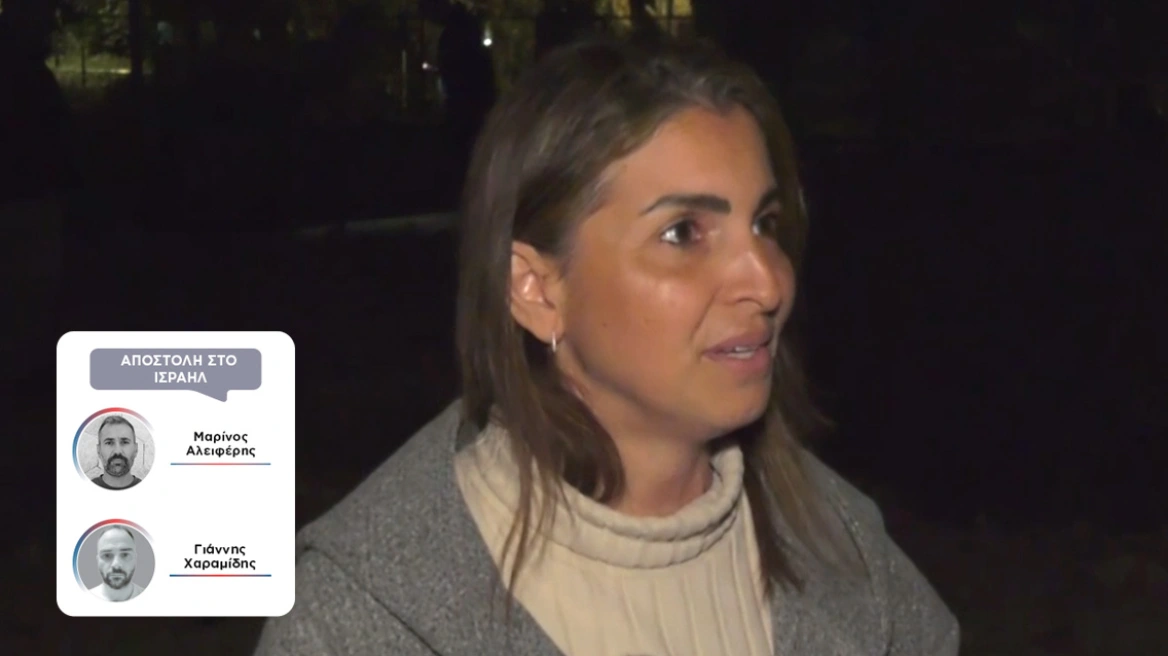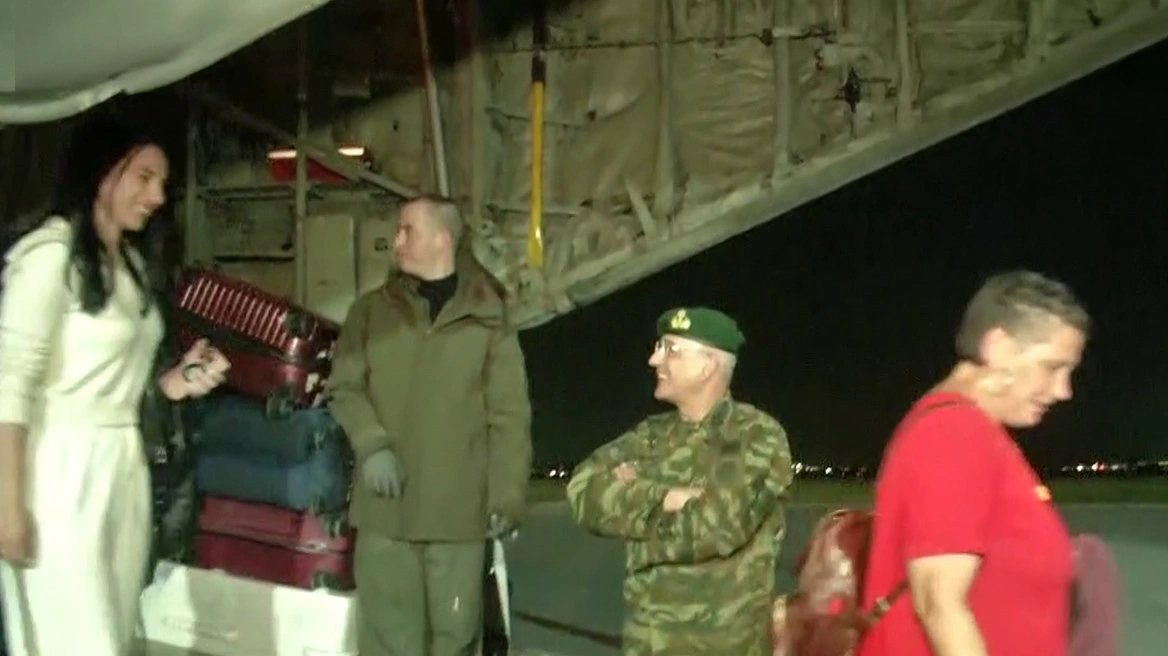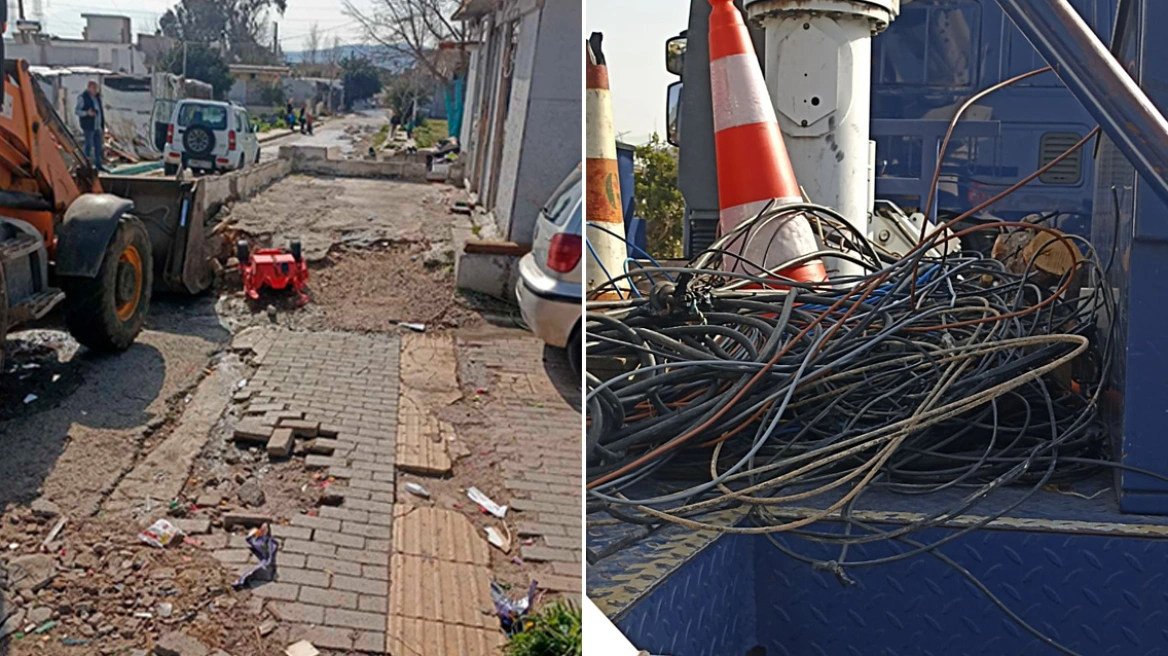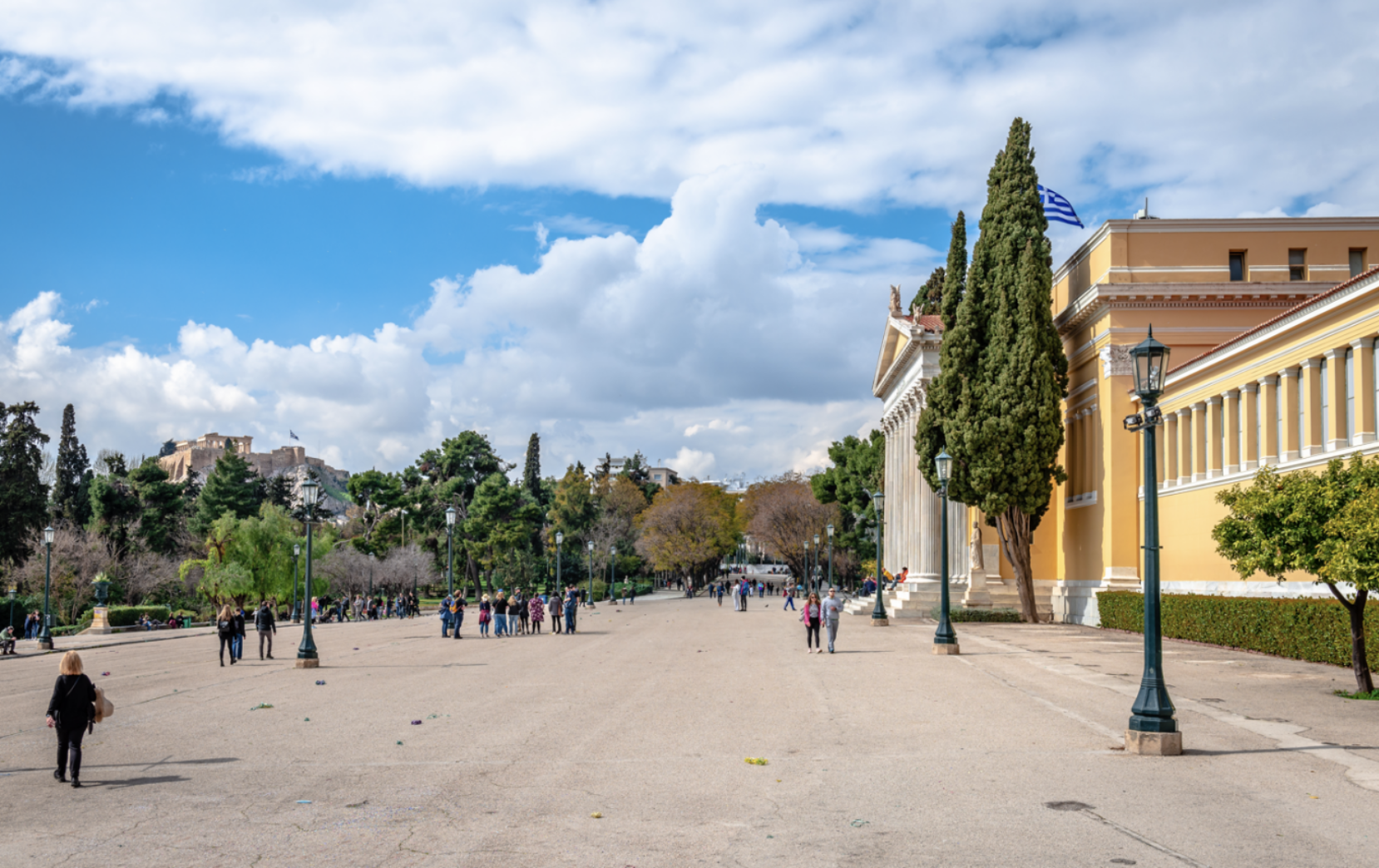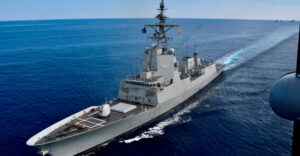Turkish President Recep Tayyip Erdoğan on his image in Germany, his troubled relationship with politicians and journalists in the country and his view of the case of imprisoned journalist Deniz Yücel.
As we slowly make our way through three separate security checks, a helicopter lands on the grounds of the Turkish president’s offices in Istanbul. Recep Tayyip Erdoğan has flown in from a different part of the city. The offices in Istanbul – which the president hardly uses, in contrast to the presidential palace in Ankara – are located in the European part of the city and is painted a vivid green. From the building’s forecourt, where we are scheduled to meet with the president, one has a view across the Bosphorus to the Asian side of Istanbul. The facility also includes two swimming pools, which can be seen in the photo that Erdoğan had someone take of him following our interview. Before we begin, Erdoğan withdraws for a time to his private quarters and we wait in a drawing room where a television camera has been set up – for the official archive, we are told. The adjacent room has been prepared for a meeting that is set to take place later in the day, Erdoğan’s preparatory meeting ahead of this week’s G-20 summit. Finally, the Turkish president sits down between two Turkish flags – an interpreter is on hand to translate our conversation in real time. We have been allotted 30 minutes – Erdoğan’s standard interview length, we are told. But it will go over by about 20 minutes. It is Erdoğan’s first interview with a German print-media outlet in more than five years. During the entire interview, his press adviser repeatedly hands him notecards bearing key words and phrases.
DIE ZEIT: Mr. President, you haven’t given an interview to a foreign newspaper for a long time. Is this discussion with a German media outlet a deliberate message – at a time when relations between your country and Germany are at a low point?
Recep Tayyip Erdoğan: Almost six years ago, there was an interview with Bild, and seven years ago with ZEIT, with you. If we now ask ourselves why our connection with Germany in particular has begun to fracture, my answer is very clear: The German media is pursuing a campaign of denigration against us. Part of this campaign has included talks with terrorists.
ZEIT: Why would the media, which is independent in Germany, engage in anti-Turkey propaganda? What kind of interest would it have in doing so?
Erdoğan: I don’t believe there is such a thing as “independent media” anywhere in the world. At some level, they are all – whether print or broadcast media – dependent, either ideologically, or they are pursuing their own interests. If there were such a thing as independent media, we wouldn’t have all these problems. We see things quite clearly: They head in whichever direction the wind is blowing. The German media is no different. Nobody can say that isn’t the case. We know very well that’s how things are.
ZEIT: Every newspaper has its own ideological affiliations. There are papers that are more liberal, and others that are more conservative. Some lean more to the left. But as a rule, no publisher – and certainly no politician – in Germany can tell newspaper journalists or editors-in-chief what to write. That is what I meant by independent.
Erdoğan (smiling): Am I supposed to believe that?
ZEIT: I’ve been editor-in-chief of ZEIT for 13 years; and I’ve never experienced any sort of interference, either from a politician or from our publishers. And were that to happen, I would resign immediately because then I would no longer be independent.
Erdoğan: Well, that hasn’t been my experience so far. I have gotten to know a great many media heads, spending a lot of time with them and speaking with them. And there have been times when I have had to show them their own newspapers. I have said: “You all speak of ethical rules, but this here is your newspaper. What about this is supposed to be ethical?” It has gone as far as slandering my own family. You have spoken of “financial connections” and of “connections with IS.” You have imputed some kind of connections to my children. Do you have proof? No. But you have continued to defame. And because I use very clear words, we are on poor terms with many of these journalists. Why? I speak frankly about everything. Many German newspapers, for example, have written that Tayyip Erdoğan is a dictator. Well, to that, I would ask: How does this outlet define a dictator?
ZEIT: Are you asking why the German public sees you as a dictator? Because in no other country in the world are there as many journalists behind bars as there are in Turkey, more than 150. Because German journalists like Deniz Yücel and Meşale Tolu are in prison, and nobody knows why. Yücel is even in solitary confinement. Because tens of thousands of people lost their jobs because they are suspected of having participated in last summer’s attempted coup. Because your intelligence agency has spied on German parliamentarians. Those are a few of the reasons why you enjoy such a reputation.
Erdoğan: The information you are receiving is incorrect. And based on this incorrect information, you develop false assumptions. (He picks up some notecards full of text.) Forty-eight of the people currently in correctional facilities, whose names have been circulated as imprisoned journalists, were convicted of numerous crimes – of terrorism first and foremost – and these verdicts have been upheld by the highest court. That is one point. Five individuals were convicted by local courts, and appeals are ongoing. Of those currently in prison, 177 have claimed to be journalists. Of those, 176 were arrested on suspicion of terrorism, and one due to a different offense. Of those people arrested, 152 have been accused of having participated in the FETÖ coup …
ZEIT: … in other words, of being members of the Gülen movement, which is considered a terrorist organization in Turkey and which has been accused of being behind the coup …
Erdoğan: … three have been accused of being FETÖ members, 18 of belonging to PKK, three of belonging to DHKP-C (Eds. Note: Revolutionary People’s Liberation Front), and one is jailed on suspicion of murder. We should be aware of all of that so that we avoid publishing anything inaccurate.
Then there is – and German Chancellor Angela Merkel has been deeply preoccupied with him – Deniz Yücel. On Feb. 27, 2017, he was accused by the 9th Istanbul Criminal Court of openly inciting the public to hatred and hostility, and of conducting propaganda on behalf of a terror organization, and he was arrested. On March 8, 9 and 22, on April 12 and 17, and on May 9, 2017, he was examined by a doctor. Public prosecutors in Istanbul have discovered that Deniz Yücel spoke with one of the PKK leaders in the Qandil Mountains, that he participated in meetings organized by the PKK, and that he conducted propaganda on behalf of the separatist terror organization. There are currently 29 German citizens in our prisons whose cases are similar to this one. You say that there are thousands of people in our prisons, and that they have lost their jobs. I want to tell you something: When East and West Germany reunified, do you know how many people lost their jobs then? More than 500,000!
ZEIT: I can’t check the numbers at the moment, but there were laws and procedures consistent with the rule of law for everything.
Erdoğan: Why don’t you talk about that, that so many people were discharged from their jobs? You are going to publish this and not delete it, right?
ZEIT: Of course. But back to Deniz Yücel. Criminal charges still haven’t been filed. He has been in prison – in solitary confinement – for 140 days. It took a long time before he was allowed consular assistance, to which he has a right. And, in Germany, a journalist wouldn’t spend even a single day in jail for any of the activities he is suspected of – the interview with a Kurdish leader, the joke about Kurds and Turks.
Erdoğan: Well, this here isn’t Germany. Turkey has its own imperatives and rules. And we are talking about an independent judiciary, an impartial judiciary. And it does what the constitution of the Turkish Republic and its laws require of it.
ZEIT: In my career, I too have interviewed right-wing and left-wing terrorists in addition to people suspected of terrorism. Do you believe that those who do such things as a journalist are terrorists, or supporters of terrorists, themselves?
Erdoğan: In my opinion, such a person is a supporter of terrorists because he knows that this person is a terrorist. What do you want to talk about with a terrorist? And where do you want to publish it? If you publish the thoughts of a terrorist in your publication, what is that? That is the publishing of terrorism itself. By doing so, you are abetting the propaganda of the terrorists. That is how it is seen by courts around the world, because they say: That is aiding and abetting the thoughts of terrorists, and that is a crime.
ZEIT: Do you believe that Turkish courts are independent?
Erdoğan: There are more than 3 million Turkish citizens living in Germany. Why do German officials prevent me, as president of Turkey, from meeting with them and speaking to them? Why don’t they allow it? How can you explain it? Where is the freedom of opinion? The freedom of thought? And while you deny a country’s head of state the right to speak, PKK members can speak and demonstrate quite comfortably – and we can’t even speak by video link, which has been banned by the Constitutional Court. But connections to PKK leaders in Qandil can be easily established. What is fair about that? Even though the PKK is listed as a terror organization in the EU, these people can demonstrate freely in Germany; they can organize meetings and raise money. How can that be?
ZEIT: I am not the spokesperson of the German government. I am a journalist.
Erdoğan: (suddenly changing to informal form of address): Just a moment ago, you spoke about being independent and about how your boss can’t tell you what to write. And now you say: “I am not the government spokesperson,” and so on. I am a politician. And I am the president of this country. I have received you. If you want to lead an independent interview, then I want to speak openly with you about things I have encountered in Germany. And you have to publish it all openly and clearly. You are only a genuine journalist if you publish it.
ZEIT: Don’t worry, it will all be published. But when you ask me why you aren’t allowed to make public appearances in Germany, I can’t answer for the German government. I can only interpret their position: It is a sign that relations with the Turkish government are currently poor. And I believe that, until the release of Deniz Yücel and the other German journalist, Meşale Tolu, who is imprisoned with her 2-year-old child, these relations will remain poor.
Erdoğan: When such things happen in Germany, officials say that the judiciary is independent. By the same token, our judiciary is independent. At present, charges are being prepared. When they are ready, and if it turns out that they are innocent, the judiciary will release them. But if they are guilty, the judiciary will rule accordingly. If German officials justify their decisions by pointing to Turkish officials, then we are heading for worse times, much worse. That is why it isn’t good for the future when we respond to negative events. We are together in NATO. There are more than 3 million Turkish citizens in Germany …
ZEIT: … Germany is your most important trading partner …
Erdoğan: … the trade volume between our countries stands at more than $35.5 billion. If the German government wishes to sacrifice our relations for a terror organization, that would be a huge mistake. Look, ahead of the referendum (Eds. Note: on the constitutional amendment over the introduction of a presidential system), German parliamentarians threw their complete support behind the No-campaign. They supported it personally. In addition, they insulted me personally. Unfortunately, our friends in the top levels of the German state said nothing about it. We have always wanted to maintain our good relations with Germany, and we still want to. We need each other. We must preserve that. Three million Turks there … that’s not trivial thing.
ZEIT: How can it be preserved?
Erdoğan: There are currently 80,000 Turkish companies in Germany that employ 480,000 people. You can’t ignore that. That is why we have to stay together. And now we are coming to the G-20 summit in Hamburg, and we have said that we would like to meet with our countrymen there – and German authorities have issued directives everywhere that Erdoğan should not be allowed to speak. What kind of a mentality is that? That is extremely ugly. I have never experienced such a thing. Germany is committing suicide. That is political suicide.
ZEIT: Why suicide? What happens if Germany commits suicide?
Erdoğan: Germany must correct this mistake.
ZEIT: That you aren’t allowed to speak?
Erdoğan: Of course, it must correct this mistake. I mean, it’s a problem that I am not allowed to share my thoughts with my citizens. Ok, if not, then we won’t speak. We’ll take part in the G-20 meeting and say what we have to say there, and then return home. But I cannot be silenced! I speak on Turkish television, and they also broadcast in Germany. They should also ban these broadcasts in Germany!
ZEIT: For Germany, and for us journalists, it is completely unacceptable that our colleagues are in prison, despite the fact that they have very clearly not supported terrorists, like Deniz Yücel. If you were to send a commensurate signal …
Erdoğan: … please, don’t defend those suspected of terrorism and who supported the terrorists …
ZEIT: … then you would likely find it easier to make public appearances in Germany!
Erdoğan: Work on behalf of respectable people! On the one hand, it is said that the PKK is a terror organization …
ZEIT: … which is banned in Germany …
Erdoğan: … and in all of Europe. But on the streets of Germany, they can comfortably hold their demonstrations with posters of the terrorist leader. What’s more, they can demonstrate in a German police car with a poster of the terrorist leader. In a German police car! We have images!
ZEIT: I’m not aware of those images.
Erdoğan: In an official state vehicle, there is a terrorist. In his hand, he is holding a poster of the terrorist leader; he waves it on one side. And, through the other door, they are waving their rags (Eds. Note: the reference is to flags). And where are they doing this? In Berlin! How can that be allowed?
ZEIT: German Interior Minister Thomas de Maizière has just announced that the authorities will strictly prohibit PKK symbols during the summit in Hamburg. Because, as you have said, the PKK is banned in Germany.
Erdoğan: Well, we will see. I hope that such measures will be taken.
ZEIT: Do you intend to send a signal of reconciliation to the chancellor?
Erdoğan: I don’t have a problem with the chancellor. At the NATO summit, I met and spoke with Ms. Merkel. We will also have a face-to-face meeting now. We will address many issues. I will address the terror problem, in addition to ways in which Europe can approach this problem, and what we as NATO countries are doing. There is no animosity between the chancellor and myself. The chancellor hasn’t made any statements about it, but unfortunately her coalition partners have.
ZEIT: You are referring to the Social Democrats (SPD). We asked the chancellor – with whom we are also publishing an interview in this issue of the paper – whether she has a message for Turkey. She answered that living together in harmony with people in Germany with Turkish backgrounds is very important to her. And she said she will not abstain from demanding the release of Deniz Yücel and other journalists. That issue is weighing heavily on relations between our two countries.
Erdoğan: Do you think that we give orders to our judiciary?
ZEIT: If the Turkish judiciary is truly independent …
Erdoğan: … answer the question first: Do you believe that we give orders to our judiciary?
ZEIT: If the Turkish judiciary is really so independent, then why did you say that Deniz Yücel won’t be extradited for as long as you are still in office?
Erdoğan: Look, we cannot issue any orders to the judiciary. Turkey is a state under the rule of law. If he is innocent, he will be acquitted. If he is guilty, the rule of law holds that a corresponding verdict will be handed down.
ZEIT: Regardless of what you want?
Erdoğan: We cannot intervene. Because whenever we speak with Chancellor Merkel or with other countries, such as the U.S., they tell us: The judiciary is independent. The leader of the Gülen terror network is in America, and we have sent all the files – 85 boxes full of them. On July 15 (Eds. Note: the day of the coup attempt), there were 250 martyrs and 2,193 people were injured. It has been proven that FETÖ followers were responsible. Nevertheless, we have seen our friends defend them. Germany is currently full of members of the FETÖ organization. Why aren’t they extradited?
ZEIT: Because the courts rule on their cases independently.
Erdoğan: I have demanded their return from Ms. Merkel. Why aren’t they given back to us? And, unfortunately, some of them are being treated as refugees. Why won’t you extradite them to us?
ZEIT: The courts decide.
Erdoğan: Then it is allowed for courts to decide here, too.
ZEIT: Have you been tempted in recent months to withdraw from NATO?
Erdoğan: Why should I consider such a thing?
ZEIT: Out of annoyance with the West?
Erdoğan: It is one thing to be disappointed in the West, and another thing to withdraw from NATO. We aren’t planning such a thing. When discussing disappointments, it is first and foremost dissatisfaction with the EU process. NATO has always been more honest with us than the EU has. The EU has been giving us the runaround since 1963. And they are still making us wait at the door. But we have patience; we will see what happens. We aren’t just any country. We have a deeply rooted tradition in our state that prevents us from reacting emotionally. Before we take a step, we deliberate and calculate.
ZEIT: Do you sometimes long for the era of Merkel’s SPD predecessor, Gerhard Schröder, a time when relations with your country were much friendlier?
Erdoğan: It’s exactly as you say: Yes, I miss those times. Because relations with Schröder were really quite different. They were very good. I hope that we can return to that. I also think that the SPD shouldn’t be behaving as they are right now.
ZEIT: You are referring to the condemnations coming from the SPD chancellor candidate Martin Schulz and others regarding the arrests of journalists in Turkey?
Erdoğan: Mr. Schulz’s approach is ideological. It isn’t clear when he does what. They want to score points domestically by instrumentalizing our relations, but they are losing. It isn’t a positive development. And I think they are also losing support from Turks in Germany in the process.
ZEIT: But, in this conflict, life hasn’t been made easier for Turks in Germany, either. It will become more difficult to hold on to dual citizenship, and there have been setbacks regarding the questions as to whether a woman wearing a headscarf can work as a civil servant. Many Turks in Germany are also concerned by such developments, and would like to hear a gesture of conciliation and concession from you.
Erdoğan: Where is the freedom of opinion? What is more natural than a woman who covers her head in accordance with her faith? Even as you devote yourself to the freedom of Deniz Yücel, you do nothing for the freedom of these women. You go to sleep, wake up and say: Deniz.
ZEIT: I was only describing the difficulties that currently exist.
Erdoğan: There are already more than a million people who have dual citizenship. Do you want to say that this right will be taken away again?
ZEIT: I’m not taking anything away from them. I was only describing the danger that currently exists.
Erdoğan: You couldn’t explain that to anybody. There are fundamental rights that cannot be turned into tools of extortion. They are part of the universal rights. This isn’t a normal thing. We are together in NATO, and want to have good relations. And then extortion? Why? To save a man suspected of terrorism. The fact that Ms. Merkel placed the saving of a terror suspect on the agenda was something I found very, very peculiar.
ZEIT: Again, Deniz Yücel has nothing to do with terrorism!
Erdoğan: Why do people defend such a person so vehemently? I can’t understand it.
ZEIT: In your 2008 speech in Cologne, you said that assimilation is a crime against humanity. Would you take that message back, or soften it, today?
Erdoğan: No, I would say the same thing again. Integration is different. I said yes to integration, but no to assimilation.
ZEIT: What does assimilation mean to you?
Erdoğan: That a person’s identity is supplanted. That they disavow their religion and their language. It means that the identity and personality of a person is supplanted. We cannot say yes to such a thing. But we, too, are in favor of integration. That means that Turks integrate into German society. That they learn the German language as well as possible, and that they conform to the traditions. But when they do all that, they shouldn’t forget their own language, tradition and religion. And that is also how our compatriots are approaching things in Germany.
ZEIT: One’s identity is shaped most strongly by what one has experienced over the course of decades. Can’t it be left up to the individual to determine how much they wish to assimilate?
Erdoğan: Turkey seeks to defend its values, just as Germany does. That shouldn’t bother anybody. When we have discussed the issue with the German side, we have always been told: You are right, no one can disagree with that. Fundamental rights cannot be taken away by force. We have a saying: You can’t force a dog to hunt.
ZEIT: Do you condemn people with Turkish backgrounds who give up their Turkish passports and only have German citizenship? Like Özlem Topçu, a journalist with ZEIT, whom I would have liked to bring along to today’s interview had it been allowed.
Erdoğan: That is their own choice. We are a conservative-democratic party, and say what our principles hold. A social democrat views the issue differently, but that doesn’t interest me. And because we conservative democrats think the way we think, we won 52 percent of the vote in Turkey.
ZEIT: In the referendum, you actually received more support from Turks living abroad – in Germany, too – than from within Turkey itself.
Erdoğan: That means that there is agreement. But that doesn’t mean that people shouldn’t integrate in the country where they live. My compatriots have to be able to live together with the Germans, to become their neighbors and friends, and to not create problems.
ZEIT: And to also refrain from exporting Turkey’s conflicts to Germany. That is something that the German government is afraid of.
Erdoğan: What kinds of conflicts are you referring to?
ZEIT: The Turkish domestic conflicts that appear in Germany, as well: Erdoğan detractors versus Erdoğan supporters, Kurds versus Turks, all of these tensions.
Erdoğan: Okay, but then I want to tell you something: If you provide support in Germany to terror organizations that operate in Turkey and there are consequences for Turkey, that is a problem for us. These people can pitch a tent in the middle of Berlin and hang up a poster of the terrorist leader. They threaten Turkish businesspeople, and raise money that they send to Turkey …
ZEIT: … I’ve already told you: The PKK is also banned in Germany …
Erdoğan: … and then, during the referendum, you see people posing with the terrorists’ rags and taking pictures. Even the leaders of a political party joined in. How can such a thing be explained? And these people call me a dictator. They should look up what dictator means!
ZEIT: Let’s talk about other strongmen. Which do you currently trust more: the Russia of President Vladimir Putin or the U.S. of President Donald Trump?
Erdoğan: Don’t make us make such a choice! You have no right to do so! We are Turkey. We develop our relations to America as best we can, and we do the same with Russia. It takes 10 hours to get to America from here, and just two-and-a-half hours to Russia. We have a common sea border with Russia in the Black Sea, and the Russians are in second place in tourism, behind Germany. Perhaps they will climb into first place. Our goal is to increase foreign trade to a level of $100 billion. Our trade volume with the U.S. has dropped significantly. Every country in the world pursues its interests. As do we, of course. Our main supplier of energy is Russia. We are completing the Turkish Stream natural gas pipeline project together, and we are building the Akkuyu nuclear power plant together. We hope that it will be finished by 2023. All of that strengthens our relations.
ZEIT: On Monday, the day of our interview, the ultimatum that Saudi Arabia issued to Qatar was extended by two days. You have always had close relations with both countries. Is it still possible to resolve the situation there? Or do you believe it will ultimately lead to an extremely dangerous, or perhaps even a military, conflict?
Erdoğan: What is being done to Qatar is in violation of international law. Point No. 13 in the ultimatum also pertains to Turkey: The bases we are building there should be closed. That shows a lack of respect for us and for Qatar. In 2014, we signed a defense treaty. I offered the same deal to Saudi Arabia. It’s not only about the security of Qatar, but about that of the entire Gulf. The Americans are also present there, with 9,000 soldiers, as are the French. Why are the Saudis not bothered by them, but they are bothered by us? That is unacceptable. That is also in violation of Qatar’s guaranteed international rights.
For example, they want the broadcaster Al-Jazeera to be shut down. What kind of press freedom is that? Such a thing is absurd. We will provide all the support we can to Qatar because we share the same values, have good relations and cannot remain silent in the face of this injustice. We will stand on the side of the victim and of the law. In this region full of crises, we are not in favor of the creation of new crises.
ZEIT: I know that our time ran out a long time ago. But perhaps you would be interested in learning how the German government views the coup that took place one year ago.
Erdoğan: If you know something, then of course. Then we will also learn who the real July 15 perpetrators are. (smiles)
ZEIT: The German government believes there was a conspiracy among parts of the Gülen movement, but that it wasn’t centrally controlled by the Gülen movement. They believe it was a coup attempt by Gülen members, Kemalists and opportunists, and that no more than 8,000 soldiers participated. That is what German intelligence has learned so far.
Erdoğan: Germany should not be the country protecting high-ranking perpetrators. The soldiers located in Germany’s NATO headquarters have assumed the role of asylum seekers, and Germany accepted it. Members of the judiciary fled to Germany.
ZEIT: Everyone can apply for asylum in Germany.
Erdoğan: But you don’t have to accept these applications.
ZEIT: Each case is unique.
Erdoğan: The first question you have to ask is: Who are you? You are a terrorist! Why did you flee? You are a public prosecutor in Turkey, and you fled? You are a member of the army, in NATO; your service comes to an end and you remain in Germany. Why? Go home to your own country. If you aren’t guilty, you won’t have any problems. And if you are guilty, you must go before the court in your own country.
ZEIT: Each case is handled on an individual basis. The German side says: Give us the proof.
Erdoğan: I have sent over 4,500 files. They contain all the evidence.
ZEIT: Then a German court can also convict coup participants. But it doesn’t have to extradite them if the court believes that they could face inhuman prison conditions or even torture in Turkey.
Erdoğan: There is no death penalty in Turkey. Don’t invent excuses! I gave Ms. Merkel 4,500 files. You have to extradite these terrorists to Turkey. For as long as you don’t do so, Turkey will see Germany as a country that protects terrorists. You should be aware of that!
Ask me anything
Explore related questions
